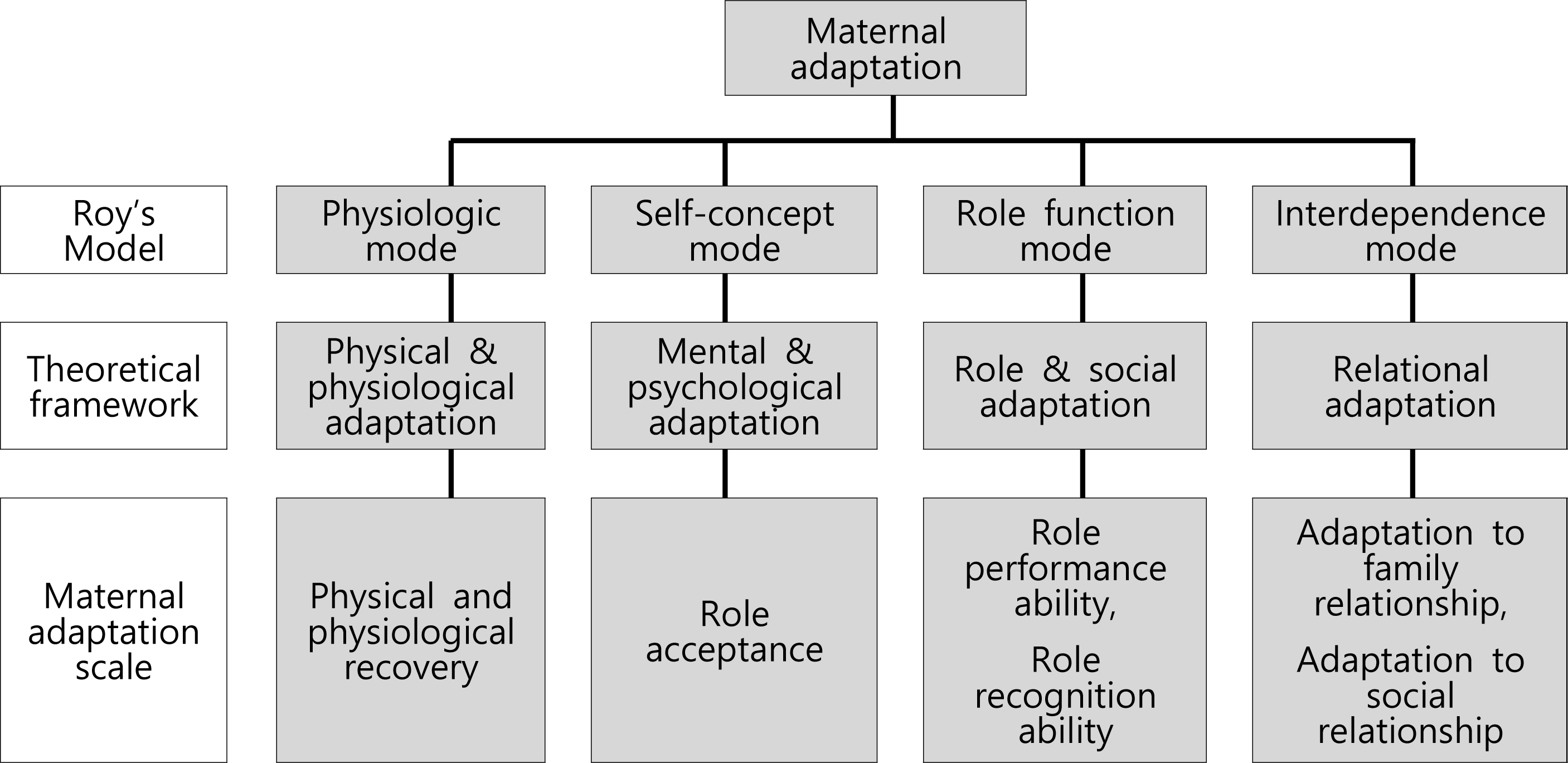J Korean Matern Child Health
.
2024 Apr;28(2):51-64. 10.21896/jkmch.2024.28.2.51.
Development of Maternal Adaptation Scale for the Primipara Women
- KMID: 2555190
- DOI: http://doi.org/10.21896/jkmch.2024.28.2.51
Abstract
- Purpose
The purpose of this study was to develop and evaluate a maternal adaptation scale for primipara in Korea. Method: The theoretical framework of this study was developed based on Roy adaptation model, a literature review, and in-depth interviews with primipara who gave birth within 6 months. Data were collected using a selfreport questionnaire at obstetrics, gynecology, and pediatric hospitals. A total of 321 primiparas who had given birth within 6 months were included in this study.
Results
An exploratory factor analysis demonstrated that the maternal adaptation scale for primipara consisted of 6 factors reflected in a total of 28 questions. A criterion validity assessment confirmed that a significant correlation was present between the developed scale and Lederman tool measuring maternal adaptation (r=0.54, p<0.001). The known-group validity was also established demonstrating that the normal group had higher scores of maternal adaptation than those of the depressed group (F=44.53, p<0.001). Cronbach α for the total scale was 0.87 and the subscales ranged from 0.73 to 0.84, establishing the scale's reliability.
Conclusion
The study concluded that this newly developed scale of maternal adaptation is a reliable and valid instrument through empirical data verification. Therefore, the scale is recommended for active use in evaluating the level of maternal adaptation of new mothers within clinical settings, and future studies investigating the phenomenon.
Figure
Reference
-
Chae HJ. Postnatal care satisfaction and educational needs for parenting of postpartum women using the postnatal care center accor-ding to parity. Health Serv Manag Rev. 2018. 12:1–10. https://dx.doi.org/10.18014/hsmr.2018.12.4.01.Choi HK., Jung NO. Factors influencing health promoting behavior in postpartum women at Sanhujoriwon. Korean J Women Health Nurs. 2017. 23:135–44.
ArticleDeVellis RF. Scale development: theory and applications. 4th ed. Thousand Oaks (CA): Sage;2017. p. 111–47.Jun NM. The effects of childbirth education on primiparas’ childbirth experience and postpartum maternal adaptation [dissertation]. Seoul (Korea): University of Seoul;2001.Jung GH., Kim KW. Development of a scale to assess immigrant women's needs for pregnancy and postpartum adaptation. Korean J Women Health Nurs. 2013. 19:242–53.
ArticleKang HC. A guide on the use of factor analysis in the assessment of construct validity. J Korean Acad Nurs. 2013. 43:587–94. https://doi.org/10.4040/jkan.2013.43.5.587.
ArticleKim JI. A Validation study on the translated Korean version of the Edinburgh postnatal depression scale. Korean J Women Health Nurs. 2006. 12:204–9. https://doi.org/10.4069/kjwhn.2006.12.3.204.
ArticleKim JS. The effect of parenting stress and depression and fatigue on quality of life in early postpartum mothers. J Conver Inf Technol. 2018. 8:1–7. https://doi.org/10.22156/CS4SMB.2018.8.6.001.
ArticleKim SH. Breastfeeding Adaptation Scale-Short Form for mothers at 2 weeks postpartum: construct validity, reliability, and measurement invariance. Korean J Women Health Nurs. 2020a. 26:326–35. https://doi.org/10.4069/kjwhn.2020.11.10.
ArticleKim SH. Development of a breast feeding adaptation scale (BFAS). J Korean Acad Nurs. 2009. 39:259–69. https://doi.org/10.4040/jkan.2009.39.2.259.
ArticleKim SJ., Seo JM. Effects of a maternal role adjustment program on first-time mothers. Korean J Women Health Nurs. 2018. 24:322–32.
ArticleKim SY., So HS. The effects of puerperium maternal anxiety, marital relationships and depression on late postpartum depression. J Korean Soc Matern Child Health. 2017. 21:139–48. https://doi.org/10.21896/jksmch.2017.21.2.139.
ArticleKim YH. A study of the psychosocial characteristics of mothers with postpartum depression. Korean J Infant Ment Health. 2020b. 13:77–122. https://doi.org/10.47801/KJIMH.13.2.4.
ArticleLederman R., Weingarten C., Lederman E. Postpartum self-evaluation questionnaire. measures of maternal adaptation. in perinatal parental behavior. Birth Defects Orig Artic Ser. 1981. 17:201–31.Lee HJ. Exploring the experience and meaning of becoming a ‘mother’ by a mother with her first child. J Eco Early Child Educ. 2019a. 18:145–72. http://doi.org/10.30761/ecoece.2019.18.2.145.
ArticleLee KH., Shin SJ. Validity of instrument development research in Korean nursing research. J Korean Acad Nurs. 2013. 43:697–703. https://doi.org/10.4040/jkan.2013.43.6.697.
ArticleLee MR., Jo JH. Development of a scale to measure the self-concept of cesarean section mothers. J Korean Acad Nurs. 1990. 20:131–41. https://doi.org/10.4040/jnas.1990.20.2.131.
ArticleLee YJ. Development of convergence of femininity-maternity scale in postpartum period [dissertation]. Daegu (Korea): University of Daegu Catholic;2019b.Lynn MR. Determination and quantification of content validity. Nurs Res. 1986. 35:382–5.
ArticleMercer RT. Becoming a mother versus maternal role attainment. J Nurs Scholarsh. 2004. 36:226–32. https://doi.org/10.1111/j.1547-5069.2004.04042.x.
ArticleMercer RT., Walker LO. A review of nursing interventions to foster becoming a mother. J Obstet Gynecol Neonatal Nurs. 2006. 35:568–82.
ArticleNunnally JC., Bernstein IH. Psychometric theory. 3rd ed. New York: McGraw-Hill;1994. p. 1–70.Pharis ME. Age and sex differences in expectation for infants and the parenting role among couples in a first pregnancy [dissertation]. Austin (TX): University of Texas at Austin;1978.Roy C. The Roy adaptation model. 3rd ed. Upper Saddle River (NJ): Pearson Education;2009. p. 100–553.Rubin R. Attainment of the maternal role part 1: process. Nurs Res. 1967. 16:237–45. https://doi.org/10.1097/00006199-196701630-00006.
ArticleSheehan F. Assessing postpartum adjustment. A pilot study. JOGN Nurs. 1981. 10:19–22.
ArticleSong JE., Ahn JA. Effect of intervention programs for improving maternal adaptation in Korea: systematic review. Korean J Women Health Nurs. 2013. 19:129–41.
ArticleSong JE., Ko JM. Influencing factors on maternal role adjustment among the primipara women in the first year after childbirth. J Korean Matern Child Health. 2016. 20:284–96.
ArticleTak JK. Psychological testing: an understanding of development and evaluation method. 2nd ed. Seoul (Korea): Hakjisa;2007.
- Full Text Links
- Actions
-
Cited
- CITED
-
- Close
- Share
- Similar articles
-
- A Clinical and Statistical Study on Pregnancy of Elderly Primipara
- Motherhood and Role Confidence in the Immediate Postpartum Period
- Development of a Scale to Assess Immigrant Women's Needs for Pregnancy and Postpartum Adaptation
- Comparing Nutrition Knowledge, Eating Habits, and Neonatal Health Status of Primipara for Pregnant Women of Advanced Maternal Age Compared to Those of Younger Ages
- Effect of Intervention Programs for Improving Maternal Adaptation in Korea: Systematic Review


